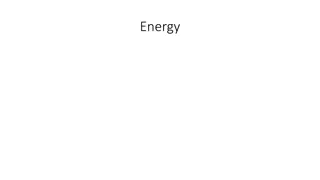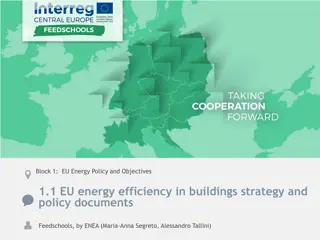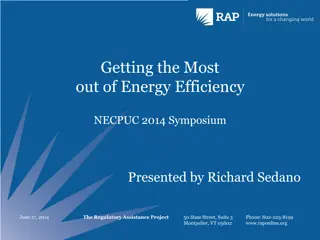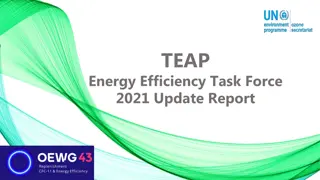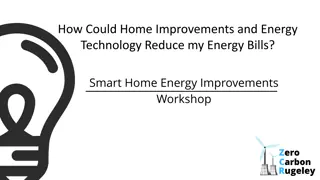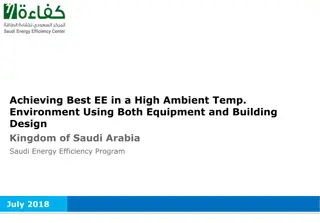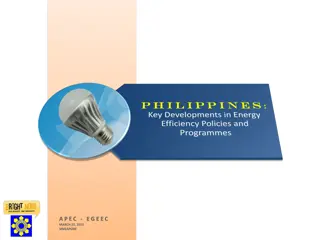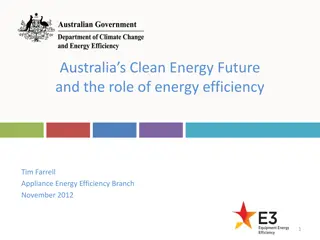Energy Saving in BSL3 Lab - AC System Efficiency
The energy consumption of AC systems in BSL3 labs is analyzed, emphasizing the importance of optimizing outdoor air intake to reduce energy usage. Circulating vs. non-circulating air systems are compared, highlighting their impact on energy efficiency and air quality control. Ventilation considerations for autoclaves are also discussed.
Download Presentation

Please find below an Image/Link to download the presentation.
The content on the website is provided AS IS for your information and personal use only. It may not be sold, licensed, or shared on other websites without obtaining consent from the author.If you encounter any issues during the download, it is possible that the publisher has removed the file from their server.
You are allowed to download the files provided on this website for personal or commercial use, subject to the condition that they are used lawfully. All files are the property of their respective owners.
The content on the website is provided AS IS for your information and personal use only. It may not be sold, licensed, or shared on other websites without obtaining consent from the author.
E N D
Presentation Transcript
Energy saving Energy saving in in BSL3 BSL3 Lab Lab 22/2/2020, 25/2/2020, 3/8/2021 Hideki Miki, Ph.D. (Engineering), JICA Expert
Why does AC (air conditioning) system spend a Why does AC (air conditioning) system spend a lot of energy? lot of energy? OA AC Room air (supply air) is controlled in temperature, humidity, cleanliness and others. SA Room air is made from outdoor air by AC system. And AC system spends a lot of energy for cooling, humidifying, filtering and others. Room Spending energy is spending money. So, room air is very valuable. OA: Outdoor air SA: Supply air AC: Air conditioner
Supply air system Supply air system RA OA Supply air system has 2 types, one is circulating air system, another is non circulating air (all outdoor air or all fresh air) system shown as right. OA EA EA AC AC SA SA Circulating system has RA, but non circulating system does not have RA. Room Room Normally character of RA is more near character of SA than character of OA. Circulating air system Non circulating air system OA: Outdoor air, SA: Supply air, EA: Exhaust air, RA: Return air, AC: Air conditioner
Circulating air system Circulating air system In case of circulating air system, OA + RA = SA (volume). If OA ratio is smaller, then energy consumption is smaller. So, generally OA is minimized. RA OA EA AC In Japan, CO2 concentration in room is limited up to 1000ppm by law for human health. Minimized OA volume is shown as below. CO2 conc. of OA [g/m3] [m3/h] [g/h] In Tokyo, recently CO2 concentration of OA is increasing, so it becomes difficult to keep CO2 concentration of 1000ppm in room. Law may be revised in future. Or to non circulating air system? ? ? SA OA vol. CO2 CO2 conc. of EA [g/m3] EA vol. Room generation x x = + [m3/h]
Non circulating air system Non circulating air system In case of non circulating air system, OA = SA = EA (volume). So, energy consumption is too large. Mottainai! OA EA AC So, non circulating system is limited of use. For example, one use is BSL3 lab or BSL4 lab. SA But why? Class III BSC has non circulating air system. But class II BSC has circulating air system. And Normally class II BSC is used in BSL3 lab. Room Which has more risk, air in room or air in BSC? Why cannot BSL3 lab have circulating air system? Exactly it depends on rules or guidelines. But .
Ventilation for autoclave Ventilation for autoclave Autoclave generates a lot of heat, and heat is transmitted from autoclave room to next rooms, and AC load increases. OA EA So, its exclusive ventilation system should be installed. Of course, by non circulating air system. Max.80degC Ventilation volume is shown as below. Auto clave Corri dor Lab room Heat genera tion [kw] Specific heat OA temp. [deg] OA vol. Specific heat EA temp. EA vol. x x x x = + [kwh/ kg deg] [kg/h] [kwh/ kg deg] [deg] [kg/h] Better
When stopping When stopping BSC BSC EA EA OA In case BSC need not to be used, BSC may be stopped. If stopping BSC, its operation energy can be saved. But it is only around 300w. AC SA If stopping BSC, SA should be decreased. If decreasing SA, AC operation energy can be saved. It is several times as BSC. Lab room BSC
Inverter control Inverter control OA OA If decreasing SA, compressor operation energy for cooling can be saved. AC AC However, in case of damper control (including CAV control), fan operation energy cannot be saved. Because it is lost as resistance of damper. Booster fan Booster fan Inverter MD If decreasing fan rotation speed by inverter (VVVF: Variable Voltage Variable Frequency), fan operation energy can be also saved. Now inverter is not so expensive. HEPA filter HEPA filter SA SA
When stopping Lab When stopping Lab If Lab room need not to be used, then AC system may be stopped, except in ABSL. If stopping AC system, its all of operation energy can be saved. But OA EA AC If stopping AC system, room temperature will increase, because freezer, refrigerator and others generates heat. SA Lab room So, it is better to operate AC system with small air volume or to operate AC system intermittently or to operate only exhaust fan a little. Free zer
My opinion My opinion Saving energy is saving money and saving CO2 emission. It is very important. But saving energy beyond limitation is not allowed. So, saving energy in BSL3 or BSL4 lab is difficult. Because saving energy should not damage to safety and quality. If circulating air system can be applied, a lot energy saving can be done. But rules and guidelines should be changed before. However, innovation may occur in future. For example, manipulator or robot may be used in lab. Then man need not enter to lab, and AC for man also need not, and a lot of saving energy with keeping safety and quality will be accomplished. It is very nice except one thing. What do AC engineers do?
End End Thank you for cooperation with training course. Email: mikiikka277@hb.tp1.jp Facebook: Miki Hideki Document server: http://gaga.jellybean.jp/indexbsl.html






